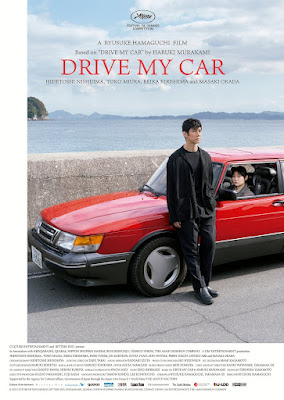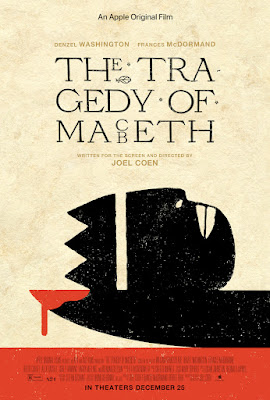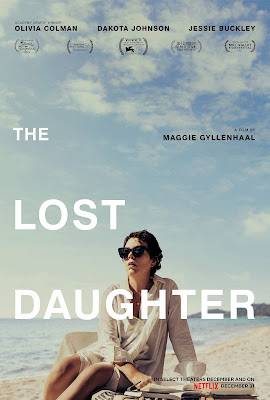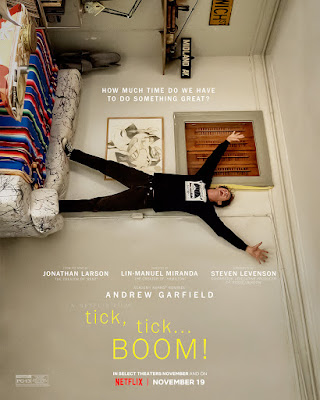by Tony Dayoub
(With Ukraine under fire and Europe on the verge of war, it seems like an odd time to discuss such a trivial matter as cinema. However, assembling this list helped distract me from current events in which I am largely helpless to affect change. I say largely because there are still avenues for assistance, one being Voices of Children, a Ukraine-based aid organization that provides psychological support to children who have witnessed war. It uses art therapy and storytelling to support children’s wellbeing, and provides financial support to families who have suffered as a result of war. I encourage you to contribute.)
1. Summer of Soul (...Or, When the Revolution Could Not Be Televised), directed by Ahmir "Questlove" Thompson - Streaming on Disney+ and Hulu - On the strength of its musical footage alone, Summer of Soul ranks among the best of the concert film genre. What elevates it to best documentary of the year, and indeed the best movie of 2021 is its importance as a historical document. While I'd like to feel that I'm pretty well versed when it comes to landmark musical events like Woodstock, Altamont, and the like, I had never heard of the series of concerts depicted here, the six-week Harlem Cultural Festival of 1969. Overshadowed by the legendary Woodstock, and unfairly so as it turns out, the festival featured musical acts such as the 5th Dimension, Ray Barreto, Mahalia Jackson, Gladys Knight & the Pips, David Ruffin, Mongo Santamaria, Nina Simone, Sly and the Family Stone, and Stevie Wonder. Director Ahmir Thompson, aka drummer Questlove of the Roots, combed through the archival footage in an effort to preserve and reaffirm the powerful shift in music and its relation to the turbulent political times faced by the black community in the late sixties. Thompson also compiled reactions from individuals who were present, like Marilyn McCoo and her husband Billy Davis, Jr., both of the 5th Dimension. They are as astonished as viewers to see how prescient some of the turmoil and its repercussions have turned out to be in this age of Black Lives Matter. In crafting such a politically conscious yet jubilant record of the event, Thompson implies that a reassessment of the US's cultural history is not only significant, but essential to the continued aspirations we hold for our country and its troubled record on civil rights.
5. Drive My Car (Doraibu mai kâ), dir. Ryûsuke Hamaguchi - Streaming on HBO Max - It may appear to be a challenge to watch a 3-hour film in Japanese devoid of the usual movie contrivances such as murder and mayhem. But Hamaguchi has crafted an engrossing film about a director (Hidetoshi Nishijima) whose lingering, mixed feelings about his unfaithful late wife takes him to a small town for a theater fellowship. An unexpected perk is the use of a personal driver (Tôko Miura) who he becomes friendly with while assisting her with her own traumatic past. Like Parasite, the gentle, hypnotically paced Drive My Car has surprised industry insiders by rising to the top ranks of many critics' lists. It has even earned a quick release on HBO Max, a platform that will no doubt place it in front of more home viewers' eyes and hopefully create a groundswell of support among Academy voters.
6. The Tragedy of Macbeth, dir. Joel Coen - Streaming on Apple+ - The latest in a long line of adaptations of Shakespeare's violent story is surprisingly potent for basically being an extended Cliffs Notes version of the Scottish Play. Joel Coen's first major release sans brother Ethan pares down the tale to its bare essentials, focusing our attention primarily on the performances, particularly those of Denzel Washington as the usurper king Macbeth, Corey Hawkins as the defiant Macduff, and the often contorted and creepy Kathryn Hunter as various sinister incarnations of the Witches. Stefan Dechant's sparse production design, Bruno Delbonnel's stark black and white cinematography, and Carter Burwell's spare musical score all work in unison with Coen and his acting ensemble to bolster the idea that, as Shakespeare voiced through another of his famous royals, "the play's the thing wherein [you'll] catch the conscience of the king."
7. House of Gucci, dir. Ridley Scott - At first glance, House of Gucci might look like a lurid freakshow and make you wonder whether it even has any business showing up on an end-of-year list like this one. What the heck is a cerebral filmmaker like Ridley Scott doing helming this dumpster fire of a movie, one might ask. What soon becomes evident is that Scott is the perfect man to direct Gucci. This because it begins to dawn on the viewer that the family at the center of the story really was a collection of divas, clowns, and oddballs whose collective story is even wilder in its entirety than the distillation we end up with onscreen. The often clinical Scott is perfect for this because he distances the viewer just far enough from these kooks to allow their qualities to be fully appreciated for the comical and lethal eccentricities they really are. The melodramatics of Lady Gaga, Al Pacino, and Jared Leto make for a dynamic contrast with Adam Driver's chilly performance as Maurizio, the most stoic Gucci in the bunch and the architect of the fashion house's near downfall in the nineties. Credit goes to Scott for wrangling this eclectic cast and their disparate performance styles to the benefit of this truth-is-stranger-than-fiction crime drama.
9. tick, tick... BOOM!, dir. Lin-Manuel Miranda - Streaming on Netflix - 2021 was Lin-Manuel Miranda's great cinematic year. The joyous film adaptation of his musical, In the Heights, was released earlier last year. He wrote the songs for Disney's hit animated film, Encanto, with two of its songs firing to the top of both the US and UK musical charts and a third nominated for an Oscar. And Miranda made his movie directorial debut with tick, tick... BOOM! Based on the autobiographical musical by the late composer Jonathan Larson (Rent), the film features a career-best performance by Andrew Garfield as Larson. With this and the celebrated return of his unfairly maligned version of Spidey in Spider-Man: No Way Home Garfield is having his own fantastic year. Perhaps it is this confluence of Miranda's and Garfield's rising good fortunes that lifts all boats including this ode to the theatrical life in New York City. The sheer exuberance of the story and Larson comes through in Garfield's starry-eyed performance. And Miranda brings it home in what is easily the musical's showstopping number set in the movie's emblematic Moondance Diner, "Sunday," featuring Broadway luminaries like André De Shields, Renée Elise Goldsberry, Joel Grey, Brian Stokes Mitchell, Bebe Neuwirth, Bernadette Peters, Phylicia Rashad, Chita Rivera, and Daphne Rubin-Vega.
10. The Power of the Dog, dir. Jane Campion - Streaming on Netflix - This is Jane Campion's most cohesive movie since The Piano. Exploring the complicated dynamics between the Burbank Brothers (Benedict Cumberbatch and Jesse Plemons) in light of the disruption caused by the introduction into their lives of a lonely restaurant owner (Kirsten Dunst) and her sensitive son (Kodi Smit-McPhee), Dog conjures up a foreboding mood. However as a character study of Phil Burbank, a closeted homosexual cowboy, it is slightly... lacking. Just ask Sam Elliott. Kidding, kidding, but only in part. Cumberbatch is miscast in the part. There is something inexpressive about the actor. Cumberbatch is always just fine... handsome but unemotional, a stoicism which works to his great benefit on Sherlock or Doctor Strange. But in roles calling for humanity Cumberbatch's limited range is more immediately apparent. Perhaps Campion felt this would sell Phil Burbank's repression. Maybe the thinking was that Cumberbatch's emotional deficit would help ameliorate the inherent melodramatics of the story. Whatever the case, it is hard to fault the movie itself; outside of the lead performance and most especially in how Burbank's stubborn denial of his sexuality has a ripple effect on Dunst and Smit-McPhee's characters, Dog is pretty involving as far as family dramas go.












No comments:
Post a Comment